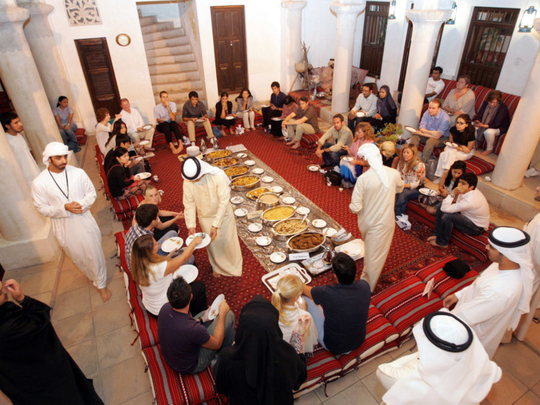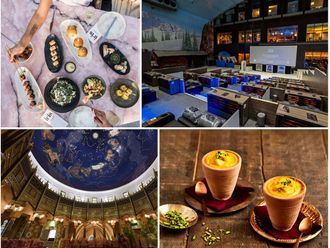
The Shaikh Mohammad Centre for Cultural Understanding (SMCCU) iftar is absolutely brilliant.
It’s one of the best things you can do as a non-Muslim to take part in Ramadan, short of actually going to someone’s home for iftar.
The non-profit organisation based in Al Fahidi District (formerly Al Bastakiya) puts on a nightly iftar where everyone present joins in a meal of Emirati dishes served in a majlis, while volunteers discuss the meaning and traditions of Ramadan, and answer any (and all) questions.
Volunteers range from old-timers to university students and even a couple of cheeky high schoolers, all ready to talk honestly about the highs and lows of their fasting that day. Dates, light Emirati coffee and water are passed around and as the azaan, or call to prayer, from the nearby Diwan mosque sounds, you end your fast.
The hosts then pray in an open-sided room next door, and all are welcome to watch and take pictures. The motto of SMCCU is “open doors, open minds”.
Then it’s time for dinner. The food is superb, and there’s plenty of it.
My highlight was the lamb margooga — described as a “messy lasagne”, it consists of meat, vegetables and gravy with layers of traditional chewy bread, which soaks up the flavours and becomes like a pasta. I had to stop myself going back for thirds.
There were also veal and chicken machboos, similar to a biriyani; chicken and vegetable saloona, a type of soupy stew served over white rice; thareed, a light vegetable stew over ragag bread; and of course, veal harees, probably the most challenging dish for a non-Emirati. Made from wheat boiled with meat until it becomes a very thick porridge, it was a discovery for me that it doesn’t have to taste like wallpaper paste, as other versions have. Nonetheless I only managed a few tablespoons.
Who actually eats harees, I wondered. My guest wouldn’t even touch it. But one of the volunteers, Asma, came and sat with us for a chat, and on her plate were only two things: A big pile of harees, and a pile of a similar dish, madrooba. She ate all of it.
Although it’s also meat and cracked wheat boiled into submission, madrooba has also got vegetables and spices, and is really tasty and comforting. It’s a bit like a grown-up baby food, so please do try it.
After dinner, guests walk through the atmospheric alleys of the old district to the mosque, where a (mostly light-hearted) lecture on Islam and its place in humanity is given. I’ve done a lot of mosque visits but it was the first time I have been present inside a mosque for the call to prayer. It was wonderful. Return to the house for dessert — creme caramel, mouhalbia, Chocodates and fresh dates — and a lesson in Emirati fashions.
Iftar is Dh135. Spaces are limited, and booking ahead is encouraged. Call 04-3536666.













